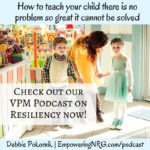Podcast 006 - Resiliency
Today we are going to talk about being resilient; what that means, why it's important and simple tips for how you can bring more of it into your life.
Resiliency is the ability to bounce back when it seems like life strikes out at you – to take whatever comes your way, handle it, learn from it and continue on. Resiliency comes into play when really difficult situations arise, such as, relationship break up, death of a loved one, loss of career, any big financial challenge, helping someone you love (including yourself) with addiction and so on.
But resiliency goes far beyond that, it also factors into your daily existence…whether it be continuing to go to a job you dislike day after day; forcing yourself to go for treatments at the doctor that you would rather not; or even bringing up a difficult conversation that could result in confrontation with somebody that you're not ready for.
It is resiliency that stops a person from giving up on life completely and it is resiliency that you use to pick yourself up and start piecing your life back together when you hit rock bottom.
So, as you can see resiliency is a very important part of our human  experience. It helps us shine our light brightly for all the world to see – which is a big part of our personal vibrancy. It factors into our self-worth and it is the fountain from which our courage and willingness to 'step up' comes from. This is a critical thing for us to model to our kids if we want to help them discover the easiest path through their journey in life. Remember – that doesn't mean problem free – it just means dealing with any obstacles as effortlessly as possible.
experience. It helps us shine our light brightly for all the world to see – which is a big part of our personal vibrancy. It factors into our self-worth and it is the fountain from which our courage and willingness to 'step up' comes from. This is a critical thing for us to model to our kids if we want to help them discover the easiest path through their journey in life. Remember – that doesn't mean problem free – it just means dealing with any obstacles as effortlessly as possible.
An absolutely essential life message for our kids to internalize (and you too if you haven't already) is that there is no problem so great it cannot be solved. Barabara Coloroso talks about this in her book Kids are Worth It (which was one of the first parenting books I read over 20 years ago) and this idea has become a foundational piece of everything I teach.
When you truly believe that you can handle whatever life throws your way you will feel more capable, you will look more capable, in fact, you will be more capable. This doesn't mean you will like what's going on in your life, or that you will only have good days, but it does mean that no matter what surfaces for you, you'll be confident that you can make it through.
An interesting little (overlooked) fact about resiliency – humans are born resilient. You do not need to learn how to become resilient, you just need to become aware of it and fully embrace the fact that this is true.
A clarification...
In this case I'm really referring to strength of spirit and not the physical ability of your body to heal. Although the two are very closely tied to each other and shifting your mindset will positively (or negatively) affect your health, there are times when your physical body simply cannot bounce back from the damage it has suffered.
This is tied to resiliency, but is too deep a conversation for us to get into in this podcast.
Being resilient doesn't mean you will not die. Death is an inevitable part of living. Being and embracing your resiliency really means that you will live your life to its fullest potential and get the most out of every experience while you are alive.
We've all heard stories of people that have dealt with incredibly horrific situations yet managed to overcome them. In every situation nothing really changed to get them out of that situation, except for their own beliefs or willingness to do what needed to be done. They experienced a change of heart…a paradigm shift really…which allowed them to dig deep and find the strength they needed to start making changes.
A story...
Josh was in Grade 4 when I met him, he had brilliant red hair, freckles and smiled a lot. He was the kind of kid that asked the 'left field' questions  in our full class program that caused the other kids to giggle and make fun. He sometimes came across as a 'know-it-all' when in fact he was just a very deep processor who was trying to understand how to fully integrate what he was learning. Truth be told, he was actually light years ahead of the kids who were making fun of him and suggesting he was 'slow'.
in our full class program that caused the other kids to giggle and make fun. He sometimes came across as a 'know-it-all' when in fact he was just a very deep processor who was trying to understand how to fully integrate what he was learning. Truth be told, he was actually light years ahead of the kids who were making fun of him and suggesting he was 'slow'.
One day, as I was leaving the school, Josh's mom stopped me and started to cry. Apparently Josh was being bullied on the bus – this had been an on-going problem since he had started school and it just wasn't going away. The other kids teased him and called him names and she was very concerned that this was going to negatively affect him in life. I could see her heart was breaking at the thought of her sweet Josh being mistreated.
Although I didn't work one-to-one with students or deal in intervention situations, I offered to give her some information to read that might help her deal with this situation more effectively.
To me Josh appeared strong, capable, resilient and a little oblivious to his 'differentness'. In other words, he seemed to have pretty thick skin and wasn't believing the teasing – which means he didn't think what the others were saying was true, so it didn't hurt.
Kind of like making fun of a person's glasses when they don't wear glasses – teasing or insulting - has to hit a nerve for it to hurt.
Mom on the other hand was very sensitive to her son's unique qualities and wanted to protect him from the brutality of what the world might throw his way.
My primary goal was to help mom recognize her son's incredible resiliency and help him build skills that he'd be able to use throughout life no matter what the world tossed his way.
To me, this is the key to dealing with most challenging situations – including bullying. Josh was likely going to stand out in any group he became part of for much of his life, so there was no way we could protect him from the many difficult situations he might face.
The best we could do was give him the skills he would need to stand up for himself; help him recognize that his 'different-ness' was part of what made him special and strengthen his already strong connection to his overall resiliency.
Mom struggled with this idea. She wanted to put on a gladiator suit and walk around with Josh protecting him from anyone who might try to hurt his sensitive soul. This caused some concern because mom was inadvertently sending a message to Josh that he could not handle this, he was not strong enough to rise above it and he needed protection if he was going to survive. This does not polish a child's resiliency but does quite the opposite – it tells them what the other kids are saying is true…that they are a victim and should be very afraid.
A few years passed and while I didn't hear much about Josh I did hear a lot about his mom. She was fighting the school board, accusing them of not adequately protecting her son; she was tapping into the safe schools movement that was gaining momentum here in our province and trying to change policies nationwide; and she was even involving the police in what was going on.
When our paths crossed again mom was crying – out and out sobbing – about what a rotten and mean world her son needed to endure and she would not stand for it. Her son, who was sitting beside her, actually winced as she went on about all the unfairness that he was experiencing. She accused me and everyone in the room of not doing enough to protect her boy and stated several times how much she knew this was hurting him. She was sticking Josh firmly into a victim role and thought she was doing it in the name of good parenting.
Rather than judge this mom, what I hope I'm making clear here is that she was doing what so many parents are doing right now. With all the publicity on bullying, with all the messages out there about the evils of our world, the dangers – viruses, illnesses, toxins, weather anomalies, the sun, drugs, – it's no wonder any of us ever leave our homes.
This is called fear mongering and it is making many people believe in the victim story and believe that the only way to protect their loved ones is to put them in a bubble…or put on their gladiator suit and become a hyper vigilant protector.
Nothing could be further from the truth.
The key to helping people thrive in life is to believe in their resiliency and to help them embrace the strength that comes with it. You can only be a victim if you choose to believe that you are – nothing changes when you adopt this belief except how vibrant and capable you feel; which in turn influences how capable you are in that moment.
So what can you do? 3 tips to help you get started...
1. Understand resiliency. Resiliency is a natural part of who you are. You do not need to teach your child how to be resilient…you just need to help him understand that it is there and learn how to keep it polished and working for him.
In the give & take relationship podcast I talked about how one way to strengthen your relationship is to give a firm and consistent message of, "I know you can handle this." This doesn't mean leaving your loved ones to their own devices and walking away…but it does mean allowing them to take ownership of the problem they are facing and letting them know you have their back.
Words you might use...
Questions: "So what do you think you can do to deal with this situation?" "How can I help you with this?" "I wonder what resources you have access to that might help?"
Comments: "I wish I had a magic wand that I could wave so I could fix this for you," "I guess this isn't really my problem to fix…I'm here for you though if you want to brainstorm ideas you can try." "This sounds like a difficult problem to solve, but I know you'll figure out something. Let me know if you want my help coming up with a plan."
Whatever you decide to say you want two messages to come through loud and clear – I know you can handle this and I've got your back.
Finally, if you are the one facing the difficult situation, remind yourself you have everything you need to deal with whatever comes up in your life – if you don't know how to proceed, seek out supports, but know that you are the only one who can 'fix' it.
Believe in your ability to do that and find other people to support you in that belief. Beware of those who want to do it for you – they often mean well, but they are not helping. One final note; remember that sometimes fixing a problem is as simple as accepting it and allowing it to unfold.
2. Refuse the role of victim… you cannot access your resiliency when you are playing the role of victim. As long as you are feeling sorry for yourself, dwelling on how unfair life is or blaming other's for everything that is going wrong for you, you will not be able to climb out of the hole you are digging. I think of these things like self-pity, revenge  planning, blaming others or victim mentality as shovels and often tell people, "You can't dig your way out of hole... so if you're in one, put down the shovel."
planning, blaming others or victim mentality as shovels and often tell people, "You can't dig your way out of hole... so if you're in one, put down the shovel."
No matter how difficult life is, it will never serve you to believe you are a victim. Our society right now is encouraging this kind of thinking and too many people have bought into it.
Your ego latches on to this fear and pulls it into your core, then uses it to stop you from taking calculated risks, from moving out of your comfort zone and even from trying to change a difficult situation. Many people stay in a bad relationship, continue to feed their own addiction, or move from one illness to another rather than putting their foot down and refusing to settle. They do this because their ego is running the show and the ego on its own, is fueled by fear.
Your life experiences are simply that – pieces of your journey meant to help you grow and evolve beyond your current level of understanding. When you choose to be afraid of them, you make the experience of going through them far more difficult and set yourself up for needing to repeat the process many times in life.
Notice your fear, acknowledge it and figure out what you need to do to rise above it. The moment you shift out of the victim role, will be the moment your resiliency starts to shine lighting a path for how to move through your current situation.
3. Focus on resourcefulness and creativity…Human beings are different from other animals because we have imagination and an ability to think beyond what we already know. In fact, creativity feeds us – not just personally but as a society. Think about all the inventions that have occurred over time to allow us to not just survive, but to thrive. Things we take for granted, such as heat sources, fridges, motorized transportation, air travel, vitamin pills…..really the list is endless.
It is this resourcefulness – that ability to find solutions to problems or to create things that allow us to function even better - that helps us evolve. Now some of you might want to argue that not all inventions have taken us in a positive direction – I would agree with that – however, for our purposes here, let's focus on the ones that have.
Just to clarify...
When I'm speaking of resourcefulness I'm talking about the ability to seek out whatever is available to you and to use that item or resource to help you deal with the situation at hand (sometimes it's people, but it can also be the internet, a certain skill set, membership in a group, and even material items). Creativity, on the other hand, is the ability to create something new or use something in a new way…like using a pencil or paper clip to pin back your hair when you haven't tried that before.
When I was in my late teens I used to love watching a show called MacGyver…which today's equivalent would be one of the reality shows like Survivorman. What I loved about MacGyver was that he could get out of any situation by using his resourcefulness (typically whatever he found lying around) and creativity. This polishes your resiliency beautifully because nothing will help you know that you can handle whatever life throws your way like creatively solving your own problem.
So don't be afraid to think outside of the box or even to use the box in a new and unexpected way. The more you do this, the more powerful you will feel.
These 3 tips are just a starting point to helping you reconnect to your resiliency and become aware of what you might be doing to dull your child's connection with their own.
In the case of Josh's mom, her heart was in the right place, yet she was actually causing more damage than the 'mean kids' at school were doing. I have no doubt that this was a piece of Josh's journey in this lifetime, so it's okay that this happened, but that doesn't mean that the rest of us can't use it as a way to learn and therefore skip down that piece of our own path.
When you believe in your own resiliency you rise above a lot of the density in life and shift yourself from the role of potential victim into that of the hardy adventurer.
With much respect for you and the journey you are on...I wish you a vibrant and powerful day!
If you enjoyed this podcast/article please like/rate/review and subscribe...that's what keeps us going!
Click here now to enjoy our other podcasts


